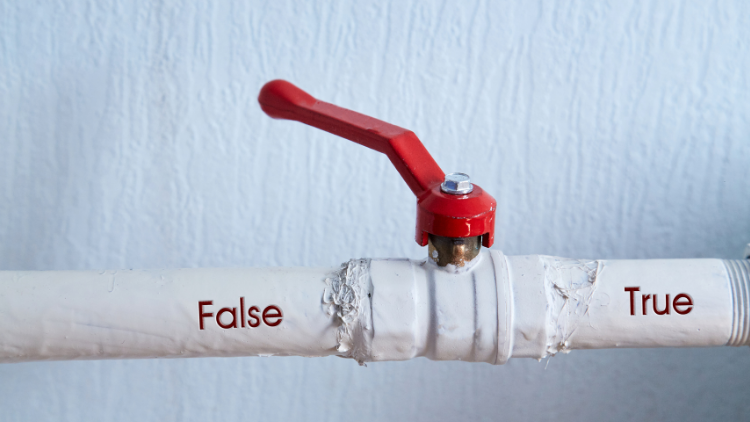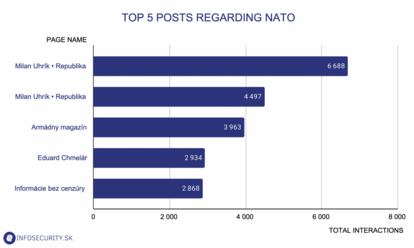DISINFORMATION
Pro-Russian actors are turning attention away from Russia's aggression in Ukraine, COVID-19 vaccination reappears among the topics

Infosecurity.sk presents an overview of disinformation trends that have been on the rise in information space in the past two weeks:
- Recently, pro-Russian actors have made a visible effort to discredit NATO and the West and thus undermine their credibility.
- Reference is made, for example, to NATO's previous involvement or other international conflicts. In this way, the actors are trying to downplay the war crimes committed by Russia in Ukraine.
- Disinformation actors have also focused on more minor issues, such as the possible use of the so-called dirty bomb in Ukraine.
- Another topic was the acquisition of COVID-19 vaccines in the European Union. Actors are using this issue to discredit the European Union or question vaccination itself.
Diverting attention from Russian aggression in Ukraine
Pro-Russian actors are trying to shift attention from Russia's aggression in Ukraine by pointing to Western states or NATO in particular.
We can observe, for example, whataboutism, in which pro-Russian actors justify Russia's actions by diverting attention to another issue and try to create the impression that similar behaviour is normal for Western states as well. However, these are often incomparable situations. The most viral post on Slovak Facebook recently was posted by Tomáš Špaček, a member of the far-right Republika party. He shared an emotional speech by MEP Mick Wallace from the Irish left-wing party Independents 4 Change. Wallace says that in relation to Russia's bombing of Ukraine, the US/NATO also terrorised Afghanistan and Iraq, Israel is terrorising Palestine every day, and France and the UK are arming Saudi Arabia, terrorising Yemen. Over 1 million people have seen the post by Špaček.
One narrative that is also present is that the war in Ukraine is, in fact, a war of NATO against Russia. For example, Lukáš Machala, a former politician who once was a member of the Slovak National Party and later of the Republika, argues this way. In a new post, he talks about the fact that World War III has begun, NATO is a terrorist organisation, and in 2020 and 2021, dozens of military convoys with NATO weapons were crossing Slovakia into Ukraine. At the same time, he asks why Slovakia is supporting the 'Khazarian neo-Nazi regime in Ukraine' and why it is not instead looking for a peaceful solution.
Various actors also seek to undermine the credibility of Slovak allies and partners. Former Prime Minister Robert Fico claims that Slovakia has a puppet government and a puppet president controlled by the US. In his words, the US government forced Slovakia to vote for sanctions against Russia, sign a defence cooperation treaty and donate a Slovak air defence system S-300 to Ukraine. Fico adds that large and powerful countries look only at their own interests and will never be fair to smaller ones.
MP Slavěna Vorobelová, who competed for a seat in parliament on the candidate list of the far-right Kotlebovci-ĽSNS party, wrote about the hacker attack on the Slovak parliament, after which the voting system was disabled. She asks whether it is a coincidence that the attack on the Slovak Parliament (and also on the Polish Senate) came at the very time when reports were emerging that the US was planning to speed up the deployment of modernised nuclear weapons to Europe. Vorobelová also claims that thanks to the Defence Cooperation Agreement (DCA) between the US and the Slovak Republic, the US does not even need the approval to deploy nuclear weapons on our territory. In reality, the US has no intention of deploying nuclear weapons in Slovakia, nor is Slovakia interested. The agreement does not even consider such a possibility at all. In this particular case, it is a matter of bringing up earlier false narratives that served the pro-Russian actors before, at the time of the signing of the DCA.
As NATO is often mentioned in posts from disinformation actors, we decided to look at the issue through the CrowdTangle analysis tool. The chart below shows the most popular Facebook posts on the Slovak disinformation scene in the last two weeks. Posts were evaluated based on the total number of interactions (the sum of all reactions, comments, and shares). In the analysis, we filtered only the posts containing the keyword NATO.

In the first post, MEP Milan Uhrík, the leader of the far-right Republika party, shared a viral post by his party colleague Tomáš Špaček including a speech by Irish MEP Mick Wallace, discussed above. In the second post, Uhrík rejected Ukraine's accession to NATO while also arguing that NATO is a destabilising element in the world's security architecture.
Armádny magazín, which often shares pro-Russian articles, reported on an anti-NATO protest in Romania, where people chanted slogans such as "Stop feeding Ukraine!"
Non-parliamentary politician and commentator Eduard Chmelár argues in his post that NATO's bombing of Yugoslavia did not have a UN Security Council mandate and can be defined as military aggression.
Finally, the Facebook page Informácie bez cenzúry shared an article reporting Putin's statement that he felt pity for Germany, prioritising its loyalty to NATO over its national interests.
Various actors are adopting pro-Kremlin narratives from the Russian embassy regarding dirty bomb
The possibility that a dirty bomb could be used in the war in Ukraine has not been overlooked in Slovakia. It has been picked up primarily by pro-Russian actors, from politicians to alternative media, who, to a large extent, are pushing the narratives coming from Russia’s embassy in Bratislava.
Between October 23 and October 24, Russia’s embassy in Slovakia published at least 12 posts on its Facebook page explicitly mentioning the dirty bomb. The posts claim Russia has credible information that Ukraine is planning to use a dirty bomb under a false flag and then accuse Russia of using nuclear weapons.
Ľuboš Blaha, a vice-chair of the Smer-SD party, who has long shared pro-Russian attitudes, speaks about the dirty bomb on his Telegram. In his words, the West is controlled by oligarchs, plutocrats and sociopaths like Joe Biden, Emmanuel Macron or Rishi Sunak, who are playing with the planet's fate and driving the world into nuclear war. As a comparison, he points out that Vladimir Putin grew up in a poor family, and Xi Jinping lived in a cave for seven years in his youth. With this comparison, Blaha tries to bring autocratic leaders closer to the audience, while defaming the Western leaders with often unsubstantiated attacks.
Other politicians promoting the pro-Kremlin narrative include MP Slavěna Vorobelová. On her Facebook page, she talks about the threat of a dirty bomb being made and used by the "Kyiv fascist junta" to blame Russia for this act and give a justification for NATO to officially enter the war in Ukraine.
The alternative media are active in spreading this false narrative as well. In many cases, this involves parroting statements made by Russian Defence Minister Sergei Shoigu or other Russian officials (InfoVojna, Armádny magazín, Veci Verejné). InfoVojna goes further and labels the Ukrainian government as a criminal regime. These actors belong to a broader web of long-term propagators of pro-Russian narratives and Kremlin propaganda.
The website Bádateľ, which specialises in publishing pseudoscientific articles, is even spreading a conspiracy theory that the West wants to trigger a global nuclear war. This is said to be the plan of "the criminal cabal of Barack Obama, Susan Rice, Victoria Nuland and Joe Biden" to "destroy America and Europe in order to cover their tracks from decades of financial plunder, kickbacks, bribery, election rigging and other forms of corruption."
COVID-19 vaccines are once again a hot topic
Recently, the European Public Prosecutor's Office (EPPO) confirmed that it is investigating the acquisition of COVID-19 vaccines in the European Union. No further information was given. Nevertheless, this has caused a reaction among various disinformation actors.
Robert Fico, leader of the Smer-SD party and former prime minister, made a video in which he criticized Ursula von der Leyen, the president of the European Commission. Fico claimed that she was personally involved in the questionable purchase of vaccines, yet she is supposedly untouchable and nothing can happen to her in this matter. He links the issue to the war in Ukraine and asks: “where would they find another head of the Commission who supports the war in Ukraine? And who has done nothing, not even lifted a finger, to ensure that the European Union is not a total vassal of the United States of America on crucial foreign policy and security issues?”
MEP Milan Uhrík concluded that "it is now officially confirmed that the vaccine was above all a business," and he also believes that they will eventually uncover "what was behind the violent vaccination campaign." In his post, he included a video with Romanian MEP Cristian Terheș in which he claims, among other things, that the vaccines did not work, were not tested, and were already being developed before the pandemic even began.
Although the public has not heard any further information from the EPPO, nor has the investigation itself been completed, various disinformation actors are taking advantage of the situation. They try to make a point that they were right after all. For example, Luboš Blaha evaluates the situation: "Yesterday a conspiracy, today the truth." and Slavěna Vorobelová concludes the topic: "But one thing is certain already today, hoaxes and conspiracies are slowly but surely turning into facts."
Project Infosecurity.sk organized by Adapt Institute, which is supported by the Prague office of the Friedrich Naumann Foundation for Freedom, continuously monitors the activities of both Slovak and foreign disinformation actors, but focuses mainly on the former. The project activities are built upon daily monitoring of emerging disinformation, hoaxes, and conspiracy theories in the online information space. This approach allows the analysts to identify disinformation posts and narratives that resonated with the public the most, as well as to find out where they originated, and how they spread and evolved on social media. The report takes the form of a bi-weekly summary of arising trends in the spread of malicious information content online. Based on that, Infosecurity.sk can warn the public about emerging and current trends in the field of disinformation, manipulation, and propaganda.

